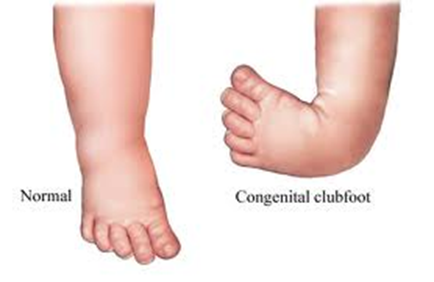A nurse is planning care for an infant who has congenital talipes equinovarus. Which of the following referrals should the nurse expect the provider to make?
Ophthalmologist
Nutrition counselor
Speech therapist
Orthopedic specialist
The Correct Answer is D
A. Ophthalmologist: This healthcare professional specializes in the diagnosis and treatment of eye disorders. While eye problems can occur in infants, congenital talipes equinovarus specifically involves foot deformities rather than eye issues. Therefore, a referral to an ophthalmologist wouldn't be appropriate for this condition.
B. Nutrition counselor: A nutrition counselor provides guidance on diet and nutrition-related issues. While nutrition is essential for overall health, it's not directly related to the treatment of congenital talipes equinovarus. Therefore, a referral to a nutrition counselor wouldn't typically be part of the care plan for this condition.
C. Speech therapist: Speech therapists, also known as speech-language pathologists, specialize in evaluating and treating communication and swallowing disorders. However, congenital talipes equinovarus doesn't affect speech or swallowing. Therefore, a referral to a speech therapist wouldn't be relevant for this condition.
D. Orthopedic specialist: An orthopedic specialist is a healthcare professional who specializes in the diagnosis and treatment of musculoskeletal conditions, including congenital abnormalities like clubfoot. They are trained to assess the severity of the deformity and develop a treatment plan, which may include non-surgical or surgical interventions to correct the foot alignment. Therefore, a referral to an orthopedic specialist is the most appropriate choice for an infant with congenital talipes equinovarus.

Nursing Test Bank
Naxlex Comprehensive Predictor Exams
Related Questions
Correct Answer is D
Explanation
A. Temperature of 38°C (100.4°F):A mild fever is not a contraindication for the MMR vaccine. In fact, a low-grade fever is common after immunizations and does not warrant withholding the vaccine.
B. Family history of sudden unexpected infant death (SUID): While a family history of SUID may be concerning, it is not a contraindication for administering the MMR vaccine. This history would not directly impact the safety or effectiveness of the vaccine.
C. Taking an antihistamine for seasonal allergies: Taking an antihistamine for seasonal allergies does not typically contraindicate the administration of the MMR vaccine. Antihistamines are generally safe to use with vaccines, and they do not interfere with the immune response to the vaccine.
D. Receiving prednisone for nephrotic syndrome:Prednisone is an immunosuppressive medication. Children receiving high-dose corticosteroids (such as prednisone) should avoid live vaccines like MMR
Correct Answer is A
Explanation
A. Initiate antibiotic therapy for the child.
This is the priority action. Bacterial meningitis is a medical emergency, and prompt administration of antibiotics is crucial to treat the infection and prevent further complications. Therefore, the nurse should initiate antibiotic therapy as soon as possible after obtaining appropriate cultures.
B. Minimize the child's environmental stimuli.
While reducing environmental stimuli can help decrease the child's discomfort and prevent agitation, it is not the priority action when managing bacterial meningitis. Treating the underlying infection takes precedence to prevent serious complications such as neurological damage or septic shock.
C. Place the child in a side-lying position.
Positioning the child on their side may help prevent aspiration if vomiting occurs, but it is not the priority action in the initial management of bacterial meningitis. The child's positioning can be adjusted as needed once antibiotic therapy has been initiated.
D. Administer pain medication to the child.
Pain management is important for the child's comfort, but it is not the priority action when managing bacterial meningitis. The child's pain may be addressed once antibiotic therapy has been initiated and the child's condition has stabilized.
Whether you are a student looking to ace your exams or a practicing nurse seeking to enhance your expertise , our nursing education contents will empower you with the confidence and competence to make a difference in the lives of patients and become a respected leader in the healthcare field.
Visit Naxlex, invest in your future and unlock endless possibilities with our unparalleled nursing education contents today
Report Wrong Answer on the Current Question
Do you disagree with the answer? If yes, what is your expected answer? Explain.
Kindly be descriptive with the issue you are facing.
